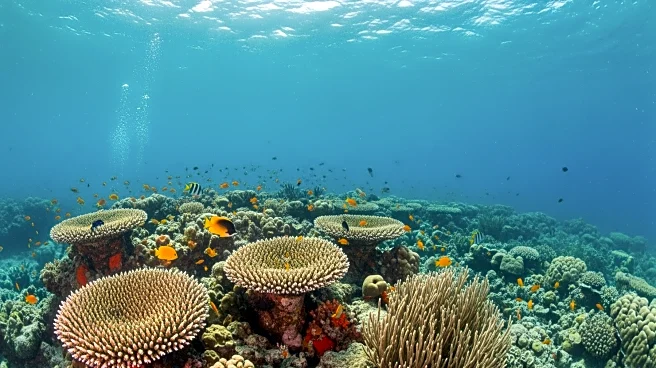What's Happening?
Researchers at the University of Queensland have conducted a study indicating that the Great Barrier Reef, which has suffered significant coral bleaching events in recent years, faces a grim future but may partially recover if global warming is kept below
2 degrees Celsius. The study utilized modeling to simulate the lifecycles of various coral species, revealing that some corals are better at adapting to warmer ocean temperatures, potentially aiding in new coral growth. Reefs located near cooler-water currents demonstrated greater resilience, offering a glimmer of hope for the reef's future. The study emphasizes the importance of reducing carbon emissions to prevent a near collapse of the reef ecosystem.
Why It's Important?
The findings underscore the critical need for global action to curb carbon emissions, as the health of the Great Barrier Reef is closely tied to climate change. The reef is one of the world's most biodiverse ecosystems, and its decline could have significant ecological and economic impacts, affecting marine life and tourism industries. The study suggests that if global warming remains below 2 degrees Celsius, some parts of the reef may recover, highlighting the importance of international climate agreements like the Paris Agreement. The potential recovery of the reef could serve as a benchmark for other ecosystems facing similar threats.
What's Next?
The study calls for immediate global efforts to reduce carbon emissions to ensure the reef's survival. Identifying resilient areas within the reef network could help focus conservation efforts on strategic parts of the ecosystem. Continued research and monitoring are essential to track the reef's response to climate change and guide policy decisions. The window for meaningful action is closing rapidly, but it remains open, emphasizing the urgency for governments and stakeholders to implement effective climate policies.
Beyond the Headlines
The study highlights the eco-evolutionary dynamics of coral species, suggesting that natural adaptation could play a role in the reef's recovery. This raises ethical considerations about human responsibility in mitigating climate change and preserving natural wonders. The research also points to the potential for innovative conservation strategies that leverage the resilience of certain coral species, offering a new perspective on ecosystem management.
















